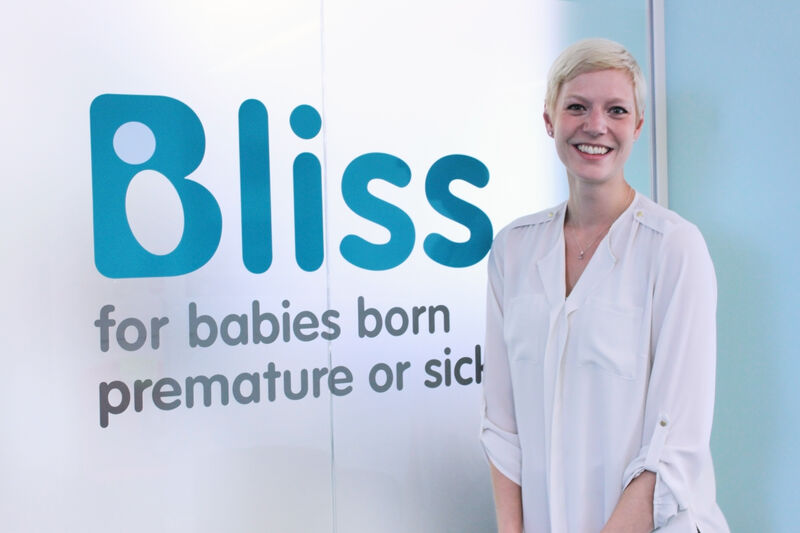You may be wondering how supporting Bliss can help improve care for babies on busy neonatal units. What you may not know is that in the background Bliss is working alongside healthcare professionals to improve the care babies receive through the Bliss Baby Charter. Here Nicola Frith, from the Bliss Healthcare Engagement Team, talks more about it in an interview originally published in our free magazine for families, Little Bliss.
Nicola, what is the Bliss Baby Charter?
The Bliss Baby Charter helps neonatal units across the UK to improve the quality of family-centred care they deliver.
What is family-centred care?
Family-centred care means supporting parents to be involved in their baby’s care and in making decisions about them. Research shows that when parents can provide hands on care in this way, babies have better outcomes.
Watch our video that explains what family-centred care is and how it benefits babies and families.
How does the Bliss Baby Charter improve family involvement in care?
The Bliss Baby Charter shows what great family-centred care looks like based on seven-guiding principles. These cover areas such as:
- The emotional support available to families
- How parents are consulted in decisions regarding their baby
- The facilities a neonatal unit has to enable parents to be involved in their baby’s care, such as overnight accommodation or a kitchen
The Charter gives recommendations and support for neonatal units to introduce lasting improvements that ensure families are consistently involved in their babies' care.
What kinds of changes have been made because of the Baby Charter?
Some of the changes made in units across the UK include:
- Training for staff so that they can offer counselling to families with babies on the unit
- Giving headphones to parents so they cannot hear medical updates about other babies during ward rounds, meaning they can stay in the room with their baby
- Introducing video diaries to share babies’ progress
Creating apps which provide key information, such as unit parking costs and visiting times - If family-centred care is so beneficial for babies, why don’t all units have this approach already?
All neonatal units aim to deliver a family-centred approach but the Baby Charter ensures that this care is of a consistently high quality amongst all neonatal units, and that babies are benefitting from the same care in every unit. This is especially important when babies are being transferred between units.
What do neonatal units think of the Bliss Baby Charter?
The Bliss Baby Charter is very popular, with 160 out of 195 neonatal units now taking part. Health professionals have told us they really value Bliss’ support in delivering workshops and training, and supporting them throughout. But while Bliss facilitates change, the teams on the units make the change happen.
How long does it take for a unit to become accredited?
On average, it takes two years for a unit to become accredited, although this does vary. There are several audits in which unit’s grade their practice from red, amber to green. When a unit is working at the recommended level Bliss will assess them to see if they are ready for accreditation. Both parents and health professionals help with the assessment.
If a unit is not accredited does it mean the care at that unit is not as good?
If a unit is accredited, it means that they are delivering exceptional family-centred care in line with the Baby Charter principles. But this does not mean that units that haven’t been accredited with us aren’t delivering a good service. These units may not be taking part in our Baby Charter or they may be at an earlier stage in their Baby Charter journey.
How can you find out if a unit is taking part in the Baby Charter?
Our interactive map shows which units are involved in the Baby Charter. Or, if you're currently on the neonatal unit, you can ask staff on the unit or contact us at [email protected] for an update.
“The hospital caring for Miles gained Bliss accreditation whilst he was there. Family involvement in care and decision making, including positive touch, changing clothes and nappies, bathing and feeding was of paramount importance and Bliss standards assisted the hospital in being able to deliver this.
“This allowed us to feel closer to our baby, more confident to ask questions and be involved in decisions regarding his care, and ultimately on the day it came to us leaving for home we felt confident in looking after him.”
- Victoria Gamble, mum to Miles born at 30 weeks
Did you know...?
Over 60 per cent of neonatal units are now working towards The Bliss Baby Charter standard of excellence and last year Bliss trained health professionals from a third of UK neonatal units.
